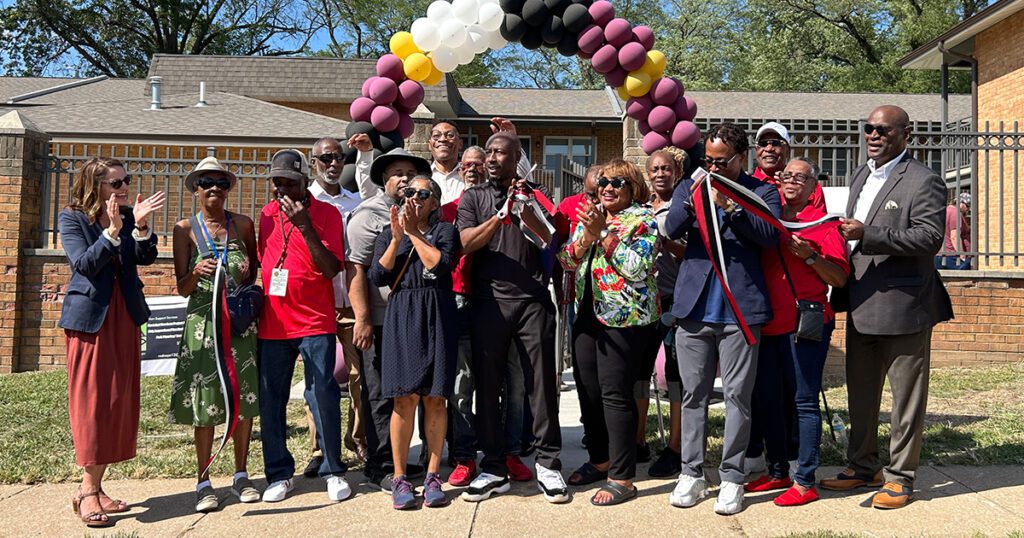April 2025 Landlord Newsletter
Table of Contents:
- Spotlight: Understanding SEMAP: What it Means for You as a Landlord
- Keys to Success
- A Place Called Home
- Resource Highlight: Building Stronger Landlord-Tenant Relationships Through Communication
- HAP Payment Policy Reminder
- Contact Us
Welcome to The Landlord Bulletin
Dear Landlords,
As we welcome spring, I want to take a moment to express our appreciation for the vital role you play in providing safe, stable housing for families across our community. Your partnership is essential to the success of the Housing Choice Voucher (HCV) program, and we value the opportunity to work alongside you in ensuring quality housing for our residents.
At County Housing, we are committed to strengthening our relationships with landlords by providing clear communication, responsive support, and helpful resources. This newsletter is just one way we aim to keep you informed about important updates, best practices, and opportunities to engage with our team.
In this issue, you’ll find information on SEMAP and what it means for you as a landlord, strategies for building stronger landlord-tenant relationships, and upcoming opportunities to connect with our team through landlord engagement offerings. We encourage you to reach out with any questions or feedback—we want to ensure that our partnership continues to benefit you and the families you serve.
Thank you for your dedication and collaboration. We look forward to working together to build stronger communities.
Sincerely,
Shannon Koenig
Chief Executive Officer
County Housing
Understanding SEMAP:
What It Means for You as a Landlord
The Section Eight Management Assessment Program (SEMAP) is a key tool used to evaluate the performance of Housing Choice Voucher (HCV) programs across the country. But what exactly is SEMAP, and how does it impact you as a landlord?
What is SEMAP?
SEMAP is a system established by the U.S. Department of Housing and Urban Development (HUD) to assess how well public housing agencies (PHAs) administer the Housing Choice Voucher program. It ensures that PHAs are effectively managing the program and providing safe, decent, and affordable housing for families.
How is SEMAP Scored?
SEMAP uses 14 performance indicators to evaluate PHAs. These indicators measure factors such as:
- Ensuring accurate and timely rent calculations
- Conducting required housing inspections on schedule
- Expanding housing choices for voucher holders
- Managing program finances responsibly
PHAs receive a rating of High Performer, Standard Performer, or Troubled based on their SEMAP score. A strong SEMAP rating reflects an efficiently managed program that benefits both landlords and residents.
How Does SEMAP Affect You as a Landlord?
A well-performing PHA creates a more efficient and stable experience for landlords participating in the HCV program. A high SEMAP score means:
Timely inspections – Inspections are completed as scheduled, reducing delays in leasing or rent payments.
Accurate rent calculations – Ensuring fair and consistent payment standards.
Program stability – A well-managed program encourages more landlords to participate, leading to a more robust rental market.
If a PHA receives a lower SEMAP score, it may require additional oversight and improvements, which can sometimes affect program efficiency.
How Can Landlords Support a Strong HCV Program?
As a landlord, you play a vital role in helping maintain a strong HCV program. You can contribute by:
- Keeping your rental units well-maintained and addressing repairs promptly.
- Attending inspections and ensuring units meet HUD’s housing quality standards.
- Communicating with the PHA about lease renewals, rent adjustments, and any concerns.
By working together, landlords and PHAs can ensure the Housing Choice Voucher program remains an effective resource for providing stable, affordable housing in our community. If you have questions about SEMAP or your role in the program, don’t hesitate to reach out to County Housing for more information!
Keys to Success
Navigating Successful Partnerships: Tools and Resources for Landlord Success
We’re excited to introduce a new way for landlords to connect with us! County Housing is launching in-person landlord engagement meetings to provide an opportunity to discuss topics that matter most to you and strengthen our ongoing partnership.
Date: June 3, 2025
Time: 5:30 p.m.
Location: County Housing, 8865 Natural Bridge Rd., St. Louis, MO 63121
📍Get directions
This session will cover:
✅ An overview of County Housing’s processes (e.g., inspections, payments, and communication)
✅ Best practices for maintaining positive landlord-tenant relationships
✅ Resources available to landlords to support residents and improve housing stability
✅ Q&A session to address landlord concerns directly
If you plan to attend, please RSVP to Anne-Marie Johnson, at annemariej@countyhousing.org.
A Place Called Home
Building Stronger Communities, One Home at a Time
At County Housing, we know that a home is more than just a physical space, it’s a place where stability begins, memories are made, and futures are shaped. As a landlord in the Housing Choice Voucher (HCV) program, you play a key role in helping families find not just a house, but a true place to call home.
Your willingness to open your doors to HCV participants does more than provide shelter, it offers a foundation for success. For many residents, your rental property becomes the backdrop for life’s most meaningful moments: a child’s first day at a new school, a family meal shared around the table, or the peace of knowing they have a secure and stable place to rest each night.
We recognize that being a landlord comes with responsibilities and challenges, and we’re here to support you. Our Landlord Liaisons are available to answer questions, provide guidance, and ensure that your partnership with County Housing is a positive and beneficial experience. Whether you need assistance with the leasing process, inspections, or program requirements, we are committed to making your experience seamless and rewarding. You can always reach our team at landlord@countyhousing.org.
By working together, we’re strengthening neighborhoods, creating opportunities, and ensuring that families have access to safe, quality housing. Your dedication helps make our community a better place – one home at a time.
Thank you for being an essential part of this mission. Together, we’re not just providing housing; we’re building brighter futures.
Resource Highlight:
Building Stronger Landlord-Tenant Relationships Through Communication
Clear and effective communication is key to maintaining positive relationships with your tenants and ensuring a smooth rental experience for both parties. Here are some best practices to improve communication and foster a respectful, professional relationship with your tenants:
1. Set Clear Expectations from the Start
When tenants first move in, provide a welcome packet or handbook that outlines:
- Lease terms and conditions
- Rent payment methods and due dates
- Maintenance request procedures
- Rules regarding property upkeep and common areas
- Contact information for urgent and non-urgent issues
This helps prevent misunderstandings and ensures tenants know what to expect.
2. Be Responsive and Accessible
Tenants appreciate timely responses to their inquiries, whether it’s a maintenance request, lease question, or general concern.
- Aim to acknowledge requests within 24 hours, even if a resolution takes longer.
- Offer multiple ways for tenants to reach you, such as email, phone, or a tenant portal.
- If you have an on-site property manager, ensure they are easily accessible and responsive.
3. Handle Maintenance Requests Efficiently
Addressing maintenance issues promptly improves tenant satisfaction and prevents small issues from turning into costly repairs.
- Establish a clear system for submitting maintenance requests.
- Keep tenants informed of timelines and updates on their requests.
- Conduct seasonal maintenance checks and inform tenants of upcoming work.
4. Keep Written Records
Document all communications regarding lease agreements, repairs, complaints, and policy updates. This will protect both landlords and tenants in case of disputes and ensure clarity on what was discussed.
5. Be Professional and Approachable
A professional yet friendly approach helps foster trust and cooperation.
- Remain courteous and respectful, even in difficult situations.
- Approach concerns with a problem-solving mindset rather than a confrontational one.
- If tensions arise, consider mediation services to resolve conflicts amicably.
6. Conduct Periodic Check-Ins
Rather than waiting for tenants to reach out with issues, consider occasional check-ins to see if they have any concerns. A quick email or message can go a long way in building goodwill and keeping an open line of communication.
By implementing these communication strategies, landlords can create a positive and cooperative rental environment, leading to longer tenancies, fewer disputes, and a stronger sense of community within their properties.
Additional Resources for Landlords
Whether you’re new to the Housing Choice Voucher (HCV) program or a long-time partner, these resources can help you stay informed and prepared.
HUD Landlord Resources: Explore tools, guides, and updates directly from HUD to support your participation in the HCV program.
NSPIRE Checklist: HUD’s NSPIRE checklist is a valuable tool for understanding what inspectors will be evaluating during unit inspections. We encourage landlords to review it as they prepare their units for inspection.
Administrative Plan & Other Documents: Our Administrative Plan outlines the policies and procedures that guide our HCV program. You can review the latest version here.
Housing Assistance Payment (HAP) Schedule Policy
County Housing is committed to ensuring timely and reliable Housing Assistance Payments (HAP) to our valued property owners and managers. To support your planning and maintain clear communication, we follow this payment schedule:
Payment Schedule:
Payments are typically processed on the 1st and 15th day of each month.
If the scheduled payment date falls on a weekend or holiday, payments will be processed on the following business day.
While payments are processed on schedule, actual deposit dates may vary based on bank processing times.
Important Notes:
Property owners and managers should account for standard banking timelines when anticipating their payment.
We greatly value your partnership and your dedication to providing safe, quality housing for our community.
County Housing 2025 Holiday Office Closures
Please be aware that County Housing will be closed on the following holidays in 2025:
- Memorial Day – Monday, May 26
- Juneteenth – Thursday, June 19
- Independence Day – Friday, July 4
- Labor Day – Monday, September 1
- Veterans Day – Tuesday, November 11
- Thanksgiving Day – Thursday, November 27
- Day After Thanksgiving – Friday, November 28
Additionally, County Housing will be closed for the holiday season from Thursday, December 25, 2025 through Thursday, January 1, 2026, and will reopen on Friday, January 2, 2026.
Contact Us
We’re Here to Help
Do you have questions or need assistance? Our team is here to support you. Whether you need help with compliance or tenant issues or just want to share feedback, don’t hesitate to reach out.
Contact Information:
- Phone: 314-428-3200
Email: landlord@countyhousing.org
Website: https://countyhousing.org/landlords/
Thank you for being an integral part of the County Housing community. Your partnership helps us provide safe, affordable housing to those who need it most. We look forward to continuing our work together to build stronger, more vibrant neighborhoods.




